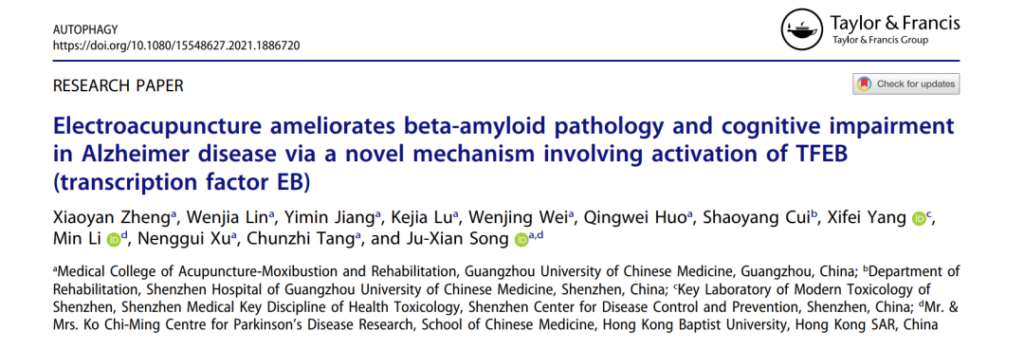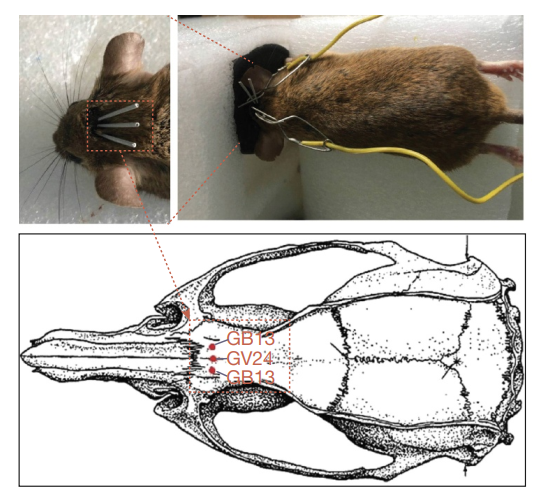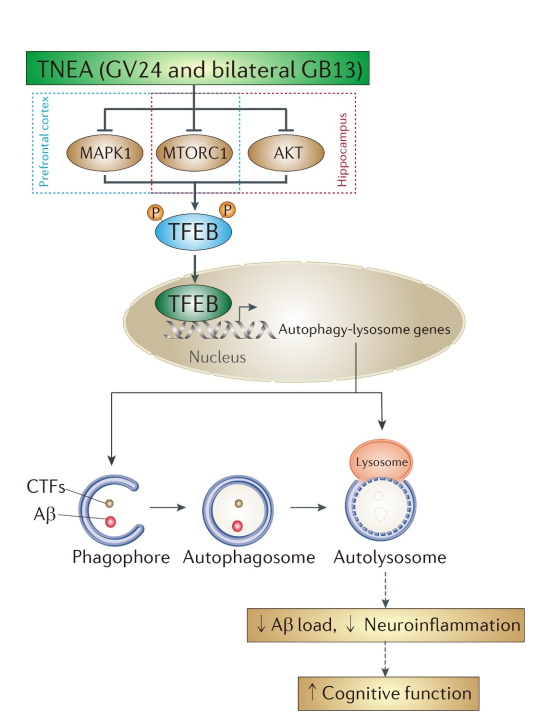Alzheimer: Electric acupuncture can enhance cognitive function
- Normal Liver Cells Found to Promote Cancer Metastasis to the Liver
- Nearly 80% Complete Remission: Breakthrough in ADC Anti-Tumor Treatment
- Vaccination Against Common Diseases May Prevent Dementia!
- New Alzheimer’s Disease (AD) Diagnosis and Staging Criteria
- Breakthrough in Alzheimer’s Disease: New Nasal Spray Halts Cognitive Decline by Targeting Toxic Protein
- Can the Tap Water at the Paris Olympics be Drunk Directly?
Alzheimer: Electric acupuncture can enhance cognitive function
Alzheimer: Electric acupuncture can enhance cognitive function. Electric acupuncture can reduce symptoms of Alzheimer’s disease and enhance cognitive function.
The paper revealed that electro-acupuncture (electro-acupuncture) can reduce Aβ pathology in Alzheimer’s disease models and improve cognitive function by activating TFEB.
Alzheimer’s disease (AD) is the most common neurodegenerative disease. β-amyloid(Aβ) senile plaques and neurofibrillary tangles formed by tau protein are two well-known pathological features of AD. There are still no drugs that can effectively treat AD.
The autophagy-lysosome pathway is a cellular process that degrades misfolded, aggregated proteins and damaged organelles through lysosomes. This process is precisely regulated by a variety of signaling pathways and factors. Among them, the transcription factor EB (TFEB ) Is a major regulator and positively regulates the autophagy-lysosome pathway. In the course of many neurodegenerative diseases such as AD, the autophagy-lysosomal pathway and the function of TFEB are impaired, which suggests that targeting TFEB may be a potential strategy for the prevention and treatment of AD.
In TCM treatment, acupuncture therapy (acupuncture therapy) and electroacupuncture therapy (electroacupuncture therapy) are commonly used auxiliary therapies for various neurodegenerative diseases. Clinical studies have shown that acupuncture can improve the cognitive function and other clinical conditions of AD patients without obvious side effects. However, the curative effect of acupuncture or electroacupuncture on AD animal models and its underlying mechanism need to be studied in depth.
“Three-needle Acupuncture for Intelligence”, namely the middle Shenting point GV24 (belonging to the Dumai point) and the Benshen point GB13 (belonging to the foot Shaoyang gall bladder meridian points) on both sides, are commonly used in southern China An acupuncture therapy for cognitive-related diseases. In addition, “Three-needle Electroacupuncture for ntelligence” (Three-needle Electroacupuncture for ntelligence)TNEA, referred to as TNEA, can also enhance the cognitive function of rats.
Recently, Song Juxian and Tang Chunzhi’s team from the College of Acupuncture and Rehabilitation of Guangzhou University of Chinese Medicine published a titled “Electroacupuncture ameliorates beta-amyloid pathology and cognitive impairment in Alzheimer disease via a novel mechanism involving activation of TFEB (transcription) in the internationally renowned academic journal Autophagy. factor EB)” research paper.
The paper revealed that electro-acupuncture (electro-acupuncture) can reduce Aβ pathology in Alzheimer’s disease models and improve cognitive function by activating TFEB. The first author of the article is Zheng Xiaoyan.

First, the author performed TNEA surgery and sham surgery on 5.5-month-old 5x FAD mice, and then applied Morris water maze and fear conditioning behavioral tests to evaluate the spatial learning and memory ability of the mice and the situational fear memory ability. (Figure 1-2). The results show. Compared with the sham operation group, the spatial learning memory and situational fear memory of the mice in the TNEA experimental group have been significantly improved, and this improvement in memory function is consistent with the amyloid precursor protein in the prefrontal cortex and hippocampus of the mice caused by TNEA ( APP) pathology is related to the decrease of Aβ pathology.
In other words, TNEA can promote the degradation of APP and Aβ, thereby enhancing memory. Neuroinflammation is also a common pathological feature of AD. Here, the authors found that TNEA inhibits the activation of microglia in the brains of AD mice, which prevents the occurrence of neuroinflammation.

Figure 1 Experimental procedure (EA: electroacupuncture; MWM: Morris water maze test; FC:: fear conditioning test; WB: western blot; IHC: immunohistochemistry)

Figure 2 “Yizhi three-needle electroacupuncture”, namely TNEA
Sustained induction of autophagy will cause damage to the autophagy tide, and there are also defects in lysosomal clearance in AD patients and mice. It has been reported that APP and Aβ can be degraded through the autophagy-lysosome pathway mediated by TFEB. Autophagy lysosomes, also called lysosomes, are formed from the fusion of primary lysosomes and autophagosomes.
The authors found that in AD mice, autophagosomes cannot be converted into autophagolysosomes normally, and TNEA treatment can restore their normal conversion; although TNEA treatment does not affect the induction (or induction) of autophagy, it can be obviously Activate TFEB and promote the production of lysosomes, reduce defective lysosomes associated with Aβ plaques, thereby degrading APP and Aβ.
So, is this TNEA-mediated degradation of APP and Aβ closely related to the autophagy-lysosome pathway? Experiments such as immunofluorescence, immunohistochemistry and western blotting showed that in the mouse brain, TNEA treatment can restore autophagosomes’ recognition of autophagic cargo or substrates and enhance their degradation; TNEA-induced lysosomal activity It is necessary for the degradation of APP and Aβ and memory improvement, and TFEB is also necessary for TNEA-induced degradation of the hydroxyl terminal (ie C-terminal) part of APP and memory improvement.
At the end of the article, experiments show that under the treatment of mouse TNEA, some kinases upstream of the TFEB pathway
(Such as MTORC1, MAPK1, AKT, etc.) activity or its phosphorylation level is significantly reduced, that is, TNEA may inhibit the kinase upstream of TFEB. In other words, TNEA may activate the phosphorylation and nuclear transport of TFEB by regulating the activity of some kinases upstream of TFEB, improve the autophagy-lysosome pathway, degrade APP and Aβ, etc., play a neuroprotective effect, and increase cognitive function. .

Figure 3 Research summary diagram (CTFs: the hydroxyl terminal (ie C-terminal) part of APP)
This study proved the cognitive enhancement effect of “Yizhi three-needle electro-acupuncture”, or “Yizhi three-needle electro-acupuncture”, namely TNEA, in an AD animal model. TNEA induces the degradation of full-length and C-terminal APP and Aβ, and inhibits the activation of glial cells in the prefrontal cortex and hippocampus, and prevents the occurrence of neuroinflammation; in terms of mechanism, TNEA activates downstream TFEB by inhibiting the AKT-MAPK1-MTORC1 pathway, thereby improving The autophagy-lysosomal pathway in the brain degrades APP and Aβ, alleviates neurotoxicity, and ultimately exerts neuroprotective effects and increases cognitive function.
Of course, the study has some unanswered questions.
(1) Although studies have shown the possible mechanism of TNEA-induced TFEB activation, more evidence is needed to verify this possibility, such as overexpression (or increase) in specific brain regions
The activity of these kinases;
(2) TFE3 is another transcription factor with similar functions to TFEB [14], then can TNEA also activate TFE3? In other words, does TNEA specifically activate TFEB?
(3) Will electroacupuncture at other different acupoints specifically act on TFEB or TFE3, or act synergistically on both, so as to play a neuroprotective effect in neurodegenerative diseases such as AD?
In general, the study shows that “Three Needle Electroacupuncture” (TNEA) is a promising treatment or adjunctive treatment of Alzheimer’s disease.
(source:internet, reference only)
Disclaimer of medicaltrend.org



